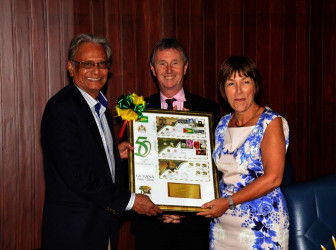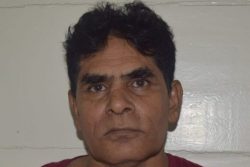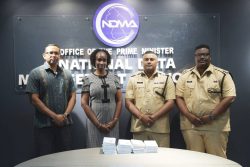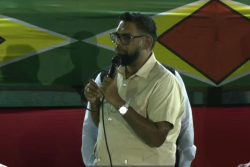President David Granger, Prime Minister Moses Nagamootoo and Ministers of the APNU+AFC Government on Thursday discussed inclusive democracy and the functioning of coalitions with visiting UK MPs.
A release from the Ministry of the Presidency said that the United Kingdom/Commonwealth Parliamentary Association (UK/CPA) team was headed by Baroness Dawn Primarolo from the British Labour Party, United Kingdom Parliament and included Alistair Carmichael MP (Liberal Democrat), United Kingdom Parliament, Nigel Evans MP (Conservative), United Kingdom, Andrew Tuggey, Head of the UK/CPA and Gosia Mc. Bride, Clerk of the Women’s Committee at the House of Commons.
The meeting held at the Ministry of the Presidency was aimed at sharing the United Kingdom’s experience

with coalition governments with the Government of Guyana and vice versa, the release said.
During the meeting, the roles of a majority coalition party versus a minority coalition party were examined through case studies from Guyana and the United Kingdom. The role of Cabinet Committees, Cabinet functions and expectations and long term aspirations were also discussed.
President David Granger at the conclusion of the meeting said that it was an enriching experience which will prove beneficial to the administration.
“Thank you for this engagement and sharing your experience. It has been a good experience for us. We have decided to embrace the coalition… we are concerned about national unity and it was really a bold step when we decided to adopt the coalition system… the coalition is still a work in progress and we do need to do more work… but we are moving in a direction of almost stable organisation,” he said, according to the release.
He told the visiting team that it is his belief that many of the problems facing Guyana can best be solved by ‘inclusionary democracy’ and that a higher degree of national unity is necessary for the country to move forward.
He said this must be accomplished “because that absence is an impediment to all forms of development, not least of all, economic development.”
“We need to create an institution, a vehicle which can give prevalence to our concept of inclusionary democracy. It is not something we wish to see perish. We wish for future generations to learn from our experiences and create a system of governance so that at the central, regional and local levels, we work in a more collaborative manner to resolve problems of this country,” the President stated, according to the press release.
Critics have said that in its 11 months in office, the government has failed to pursue this wish of an inclusive democracy and national unity. They point out that there has been no real effort at dialogue with the opposition PPP/C. There have also been other discordant signs like the taking of all seats on the finance committees of municipalities where the government coalition has a majority. This despite the fact that there are other groups represented on the councils.
The Ministry of the Presidency release reported Baroness Primarolo as saying “I think what all of us are trying to learn…is how can we make sure that those coalitions, which have been elected by the people in a democratic vote, can work in order to develop the hopes and aspirations of the people. One of our experiences is the inner workings of coalition governments… What is important in any government is that we have that inclusive approach and that we are doing it in a way that our electors trust us and our work and so the problem for all of us is that there is no one formula and so we were here to share our experiences and how the Parliament works and evolves”.
The Baroness said that that there is a lot to learn from Guyana’s coalition government and the team is using its opportunity to glean as much information as possible. Of particular interest she said, was the issue of inclusive democracy.
“In the UK, we are changing our system so that we can involve more people in it, in [terms of] setting the agendas for Parliament and expressing views on what we are debating and the Guyanese Members of Parliament wanted to know how we were doing it and how we were achieving that inclusivity so we shared experiences on that as well,” she said.








